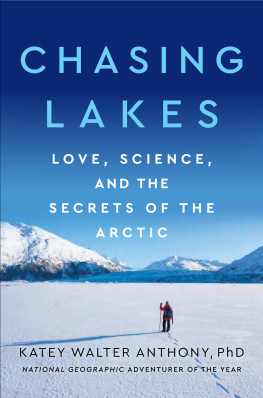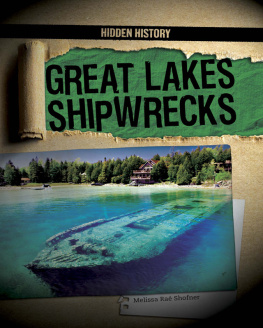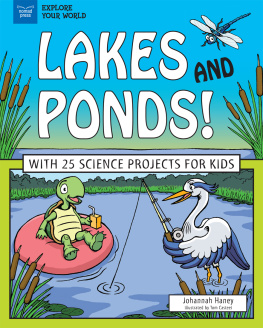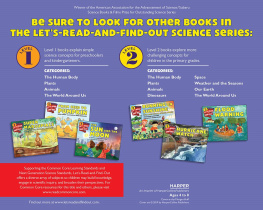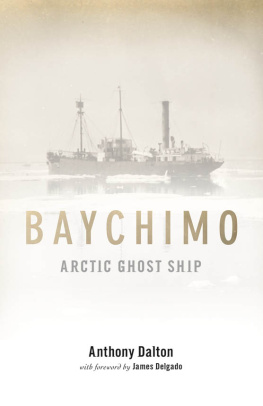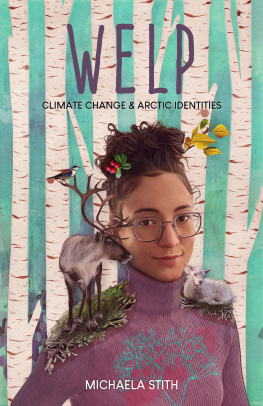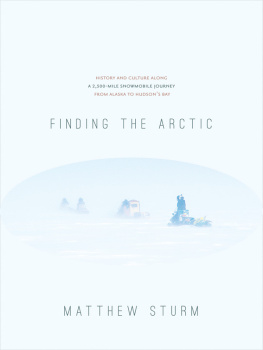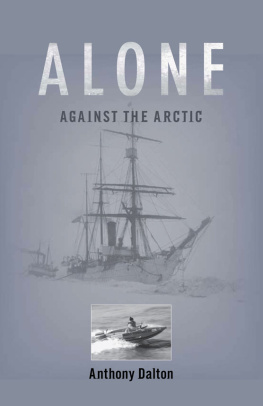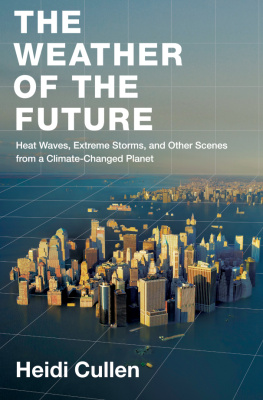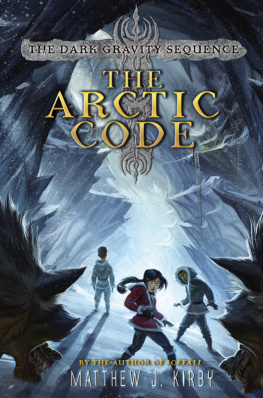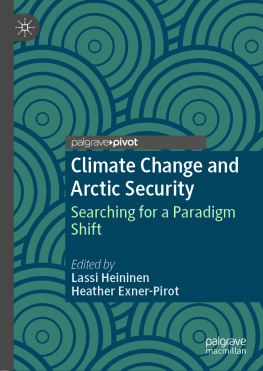
Polar map view of locations in my story
Katey and Peter Anthony
For Mom, who showed me that flowers can spring from ashes
And for Dad, who first taught me to inquire
Contents
Theres a pond Ive watched for the last twenty years. It sits behind the University of Alaska Fairbanks, where Im a professor and scientist. Thats what I do professionally: watch lakes and ponds, and share their secrets. Its not an ordinary pond like the type I grew up with in the high alpine meadows of the Sierra Nevada. This pond is a greedy pond, a gluttonous pond. This pond echoes the mystery that Ive spent my professional life solving, as well as the deeper mysteries of my own heart that have been revealed over the years.
Not content to remain within the constraints of the topography around it, this pond actively lowers the landscapeday by day, year by yearcarving for itself an ever-larger basin to fill with its own black water. Most students passing this pond along the bike path on their way to campus see only the sparkle on the waters surface and the ripples from the lesser scaup diving ducks, which make the pond their summer home. They dont notice this ponds tactics. But Im watching this pond. I know its hunger.
The shore where I used to tie my research raft, back when I first started measuring the pond, was once underlain by ice-rich permafrost. The perennially frozen ground was covered with soft green hummocks of sphagnum moss and wild cranberries. A sparse canopy of spruce and paper birch trees had at one time shaded my rubber boat from this high-latitude regions midnight sun.
But heat from the pond has been melting the ground ice. As the ponds margin collapsed, berries were drowned. Now only a few dead tree trunks stand above the waters surface. Around the pond, other trees are tipping, falling, and disappearing into the pond, as the very earth in which they are rooted gives way to the ponds appetite.
I watch as a mating pair of lesser scaup glide between flooded snags. In their wake, I see a sprinkle of silvery bubbles rise to the black waters surface. The dime-size bubbles dance out, coming to rest in a perfect, two-foot-wide circle, where they pause for a moment before bursting to join our atmosphere.
On this breezeless day, I see more spurts of bubbles rise across the pond, radiating out into bubble-circles of different sizes that linger for only a second before they, too, pop. I know these bubbles well. They are the burping and belching of methane gas released from the ponds murky digestive tract, where microbes living in the cold, dark sediments feast on the remains of ancient plants and animals buried beneath thick, sticky mud. These bubbles hold a secret.
With funnel-like homemade bubble traps I invented as a graduate student while studying lakes in Siberia, Ive captured bubbles on this pond, bottled them up, and analyzed their methane content in a laboratory for decades. What Ive learned from the bubbles Ive collected on this pond, and many others like it, is that a unique source of methane dominates the bubbles from these Arctic lakes, particularly lakes beneath which permafrost is rapidly thawing.
Ancient carbon, locked away as the remains of plants and animals that died and became incorporated into permafrost soils thousands of years ago, is being released as bubbles of methane. Compared to an equal amount of carbon dioxide, methane is a far more potent greenhouse gas, contributing to climate warming by trapping the suns radiation and heating Earths surface.
Once the permafrost thaw process has begun, this pond and millions of other permafrost thaw lakes strewn across the Arctic will continue to consume the frozen soils around them, generating more methane, which in turn leads to more warming and thawing. This vicious feedback cycle threatens to accelerate climate warming beyond what most models predict.
I arrived at this pond in 2000, as a twenty-four-year-old graduate student who thought that survival in this world depended on my own hard work and an iron will. I moved away from my family at the age of twelve. In 1992, at age sixteen, I went to live on my own for a year in Russia in the aftermath of the fall of the Soviet Union. Having discovered as a child the serenity and escape from humanity that remote lakes offer, I came to Alaska in 2000 with a will to be among such lakes, to know them and to learn the secrets of their scientific importance.
Today, I am the wife of a Minnesota farmer who splits his time between seeking ways to grow food more sustainably in the US Midwest and assisting me in the Arctic with science. I am also the mother and joint homeschool teacher of our two boys, who often accompany us on our research trips into the wilderness. Coming to terms with my tripartite role of wife, mother, and scientist, Ive had to face an entirely new kind of challenge: the dark inner workings of my own heart. Like the universitys pond, whose gluttony consumes the very shores that outline its existence, I, like all people of the human race, was born apt to take from people and my environment more than was my nature to give back. But there is hope for people as they age and mature, if their ears are open to wisdom and their hearts to change.
As a scientist and a Christian, I believe that if we are to be good stewards of this Earth we call home, we must start by knowing it. Knowing it requires time spent observing and watching, connecting pieces of information in our minds, and discerning what is right. We can propagate goodness as we share discoveries of the natural world with our children, grandparents, and friends by spending time with them in nature, studying it, drawing it, and writing about it.
As a scientist who wasnt convinced twenty years ago that climate change was immediately observable, and as a Christian who twenty years ago wasnt sure I believed in God, today I believe in both. We have a responsibility to take care of the planet and the people who live on it. We cannot afford to procrastinate any longer. We also have a choice about how we view change. We can adapt to it and look for ways to help make the changes positive. Im thankful for the God-given hope that good will prevail. I hold my husbands hand, teach my boys, and return to work every morning with that hope.
K atya, I am beating your face on the asphalt, Sergey said to me in Russian.
I sat hugging my knees on the doorstep of Sergeys tattered yellow laboratory building, feeling like a lost child. The year was 2001, and I was at the end of my ropea lowly twenty-five-year-old graduate student with seemingly no hope of accomplishing what I was meant to do.
By using this Russian expression, Sergey was taking a hard stand against my latest effort to get results. Id suggested that instead of measuring the methane bubbles in the lake, which I wasnt doing well, I try to measure the methane coming out of plants growing in the Arctic lake-side wetlands.
That is a waste of time. Sergey frowned at me. Katya, if you dont follow my direction, you can spend your remaining time at my science station working as a cook instead of doing research.
These words stung. I gulped to keep my emotions hidden inside. My head burned with rage. I hadnt come all this way to be a cook. I was bound and determined to become a scientist. Since Id left home as an adolescent, no one had ever threatened me about how I spent my time. Time was mine. My own will was the force that steered the rudder of my life.

